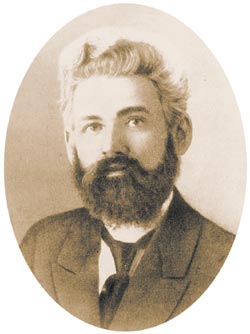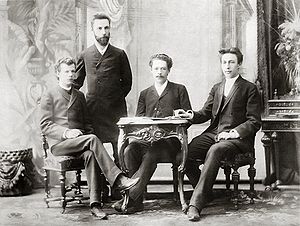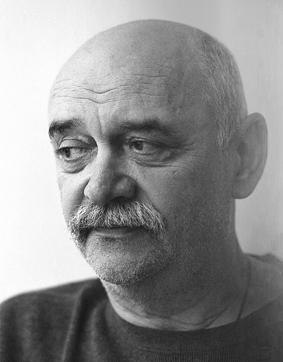Discover Your Roots
SIGN UPDiscover Your Roots
SIGN UPLev is a male name of Hebrew origin, meaning "heart." Its Greek counterpart, Λέων, translates to "lion," and the name is common in Slavic and Jewish communities. Lev became popular in Russia in the 20th century, influenced by renowned figures like Lev Tolstoy. Notable individuals with this name include Lev Landau, a Soviet physicist and Nobel laureate, Lev Tolstoy, the famous Russian author, and Lev Vygotsky, a prominent Soviet psychologist. The name carries a strong historical and cultural significance, particularly in Russian and Jewish contexts. Additionally, the name Lev is associated with traits like strength, courage, and passion, reflecting its Hebrew meaning of "heart."

Lev Grigorevich Levin, also known as Usher Gershevich Leib Levin, was a renowned physician, doctor of medical sciences, and professor, with a significant role in the medical and sanitary control of the Kremlin. He graduated from the Physics and Mathematics Faculty of Odessa University and the Medical Faculty of Moscow University. Throughout his career, he served as a prominent doctor, providing medical care to influential figures such as Maxim Gorky, Vladimir Lenin, and many other party and government leaders. Tragically, Levin was arrested and later executed in 1938, following a controversial trial. His family also faced persecution, with his son Georgy Lvovich Levin enduring imprisonment during the Doctors' plot, and his other son, Vladimir Lvovich Levin, being executed on charges of involvement in a plot. His daughter, Elena Lvovna Levina, was married to the theater actor Leonid Leonidov. The legacy of Lev Grigorevich Levin lives on through his descendants, including the Soviet songwriter and pop administrator Pavel Leonidov, and the actor, author, and performer of songs, Vladimir Vysotsky.

Lev Semyonovich Berg, also known as Leo S. Berg, was a prominent Russian geographer, biologist, and ichthyologist, best known for his evolutionary theory, nomogenesis. Born in 1876 in Bessarabia to a Jewish family, Berg converted to Christianity to pursue his studies at Moscow State University. He made significant contributions to the field of ichthyology and was a member of the Russian Academy of Sciences. Berg's work on the depth of Central Asian lakes and natural zones became foundational in Soviet biology. His influential monographs on climatology and the study of fishes in Russia earned him accolades, including the prestigious Stalin Prize.Berg's evolutionary theory, nomogenesis, challenged Darwin's theory of evolution, emphasizing the limitations of natural selection and proposing directed mass mutations as the main mechanism for directing evolution. Despite distancing himself from Darwinism and Lamarckism, Berg advocated for adaptive evolution. His book "Nomogenesis; or, Evolution Determined by Law" presented a strong criticism of Darwin's theory, earning praise from renowned biologist J. B. S. Haldane.Berg's personal life included two marriages and two children. He passed away in 1950 in Leningrad, leaving a lasting legacy in the fields of biology, geography, and evolutionary theory. His name is commemorated in the Latin appellations of over 60 species of plants and animals, reflecting his enduring impact on the scientific community.

Lev Eduardovich Conus, also known as Leon Conus, was a prominent Russian pianist, music educator, and composer. He was born in 1871 and was recognized for his exceptional talent and contributions to the world of music. Conus was part of a family of musicians, including his brothers Georgi Conus and Julius Conus. He had the privilege of studying alongside the renowned Sergei Rachmaninoff in Anton Arensky's advanced composition class. Conus held the esteemed position of chief professor of piano at the Moscow Conservatory. In 1921, he and his wife, Olga Kovalevskaya Conus, relocated to Paris before eventually settling in the United States in 1935. Conus continued to share his expertise by teaching at various institutions, including the Russian Conservatory in Paris and Cincinnati. His legacy lives on through his influential book, "Fundamentals of Piano Technique," which was published posthumously by his wife. Conus's technical exercises for pianists continue to inspire and benefit musicians worldwide. His impact on the world of music is undeniable, and his contributions are cherished by many.

Lev Shulimovich Shekhtman, born on March 10, 1951, is a prominent American theatre director and actor. His theatrical journey began in Chernivtsi, Ukraine, where he received his earliest training at the local children's theater under the guidance of V. V. Bespoletova. After enrolling in a directing/acting class at the St. Petersburg State Academy for Theatre Arts, he honed his skills under the tutelage of Professor A. A. Muzil. Shekhtman made his American directorial debut in 1979 with Nikolai Gogol's "Marriage," earning acclaim for his exceptional direction. Throughout his career, he has displayed versatility by collaborating with renowned theater companies and directing a diverse repertoire of plays, including works by Anton Chekhov, Tennessee Williams, and Albert Camus. In addition to his directorial prowess, Shekhtman has also showcased his acting abilities in various films and television productions, winning accolades for his performances. His contributions to the theater industry extend beyond the stage, as he co-founded the Theater of Russian Actors (TRACT) in New York City, demonstrating his commitment to nurturing talent and promoting cultural exchange. Shekhtman's passion for storytelling and his dedication to the arts continue to inspire audiences worldwide.

All images displayed on this page are sourced from Wikipedia or Wikimedia Commons.We use these images under their respective Creative Commons or public domain licenses. Wherever applicable, author attributions and license information are provided. If you believe an image is used incorrectly or outside its license terms, please contact us so that we can review and correct the issue.